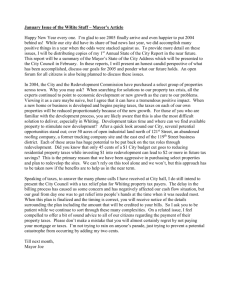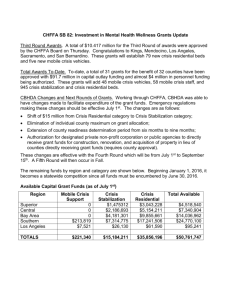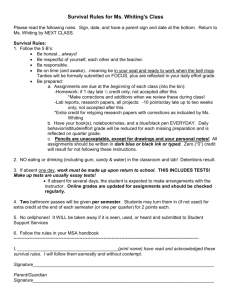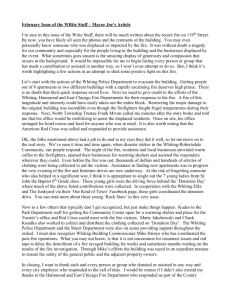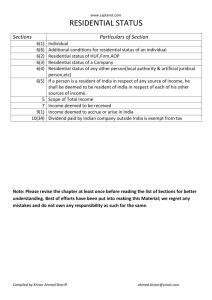Matching Assistance Strategy
advertisement
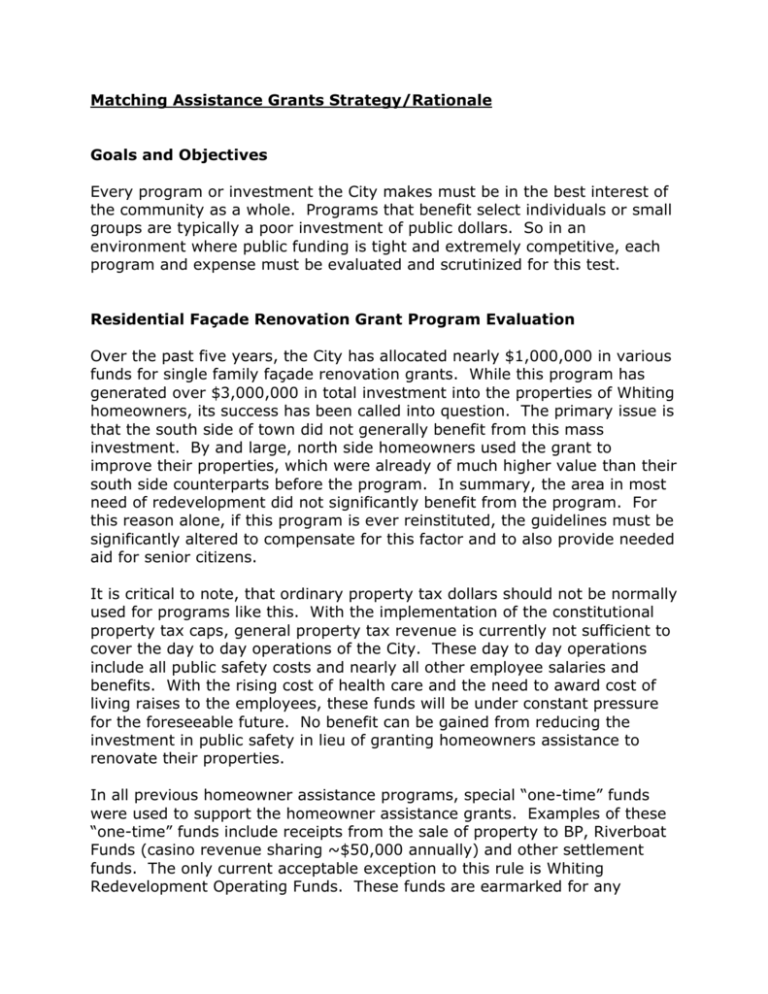
Matching Assistance Grants Strategy/Rationale Goals and Objectives Every program or investment the City makes must be in the best interest of the community as a whole. Programs that benefit select individuals or small groups are typically a poor investment of public dollars. So in an environment where public funding is tight and extremely competitive, each program and expense must be evaluated and scrutinized for this test. Residential Façade Renovation Grant Program Evaluation Over the past five years, the City has allocated nearly $1,000,000 in various funds for single family façade renovation grants. While this program has generated over $3,000,000 in total investment into the properties of Whiting homeowners, its success has been called into question. The primary issue is that the south side of town did not generally benefit from this mass investment. By and large, north side homeowners used the grant to improve their properties, which were already of much higher value than their south side counterparts before the program. In summary, the area in most need of redevelopment did not significantly benefit from the program. For this reason alone, if this program is ever reinstituted, the guidelines must be significantly altered to compensate for this factor and to also provide needed aid for senior citizens. It is critical to note, that ordinary property tax dollars should not be normally used for programs like this. With the implementation of the constitutional property tax caps, general property tax revenue is currently not sufficient to cover the day to day operations of the City. These day to day operations include all public safety costs and nearly all other employee salaries and benefits. With the rising cost of health care and the need to award cost of living raises to the employees, these funds will be under constant pressure for the foreseeable future. No benefit can be gained from reducing the investment in public safety in lieu of granting homeowners assistance to renovate their properties. In all previous homeowner assistance programs, special “one-time” funds were used to support the homeowner assistance grants. Examples of these “one-time” funds include receipts from the sale of property to BP, Riverboat Funds (casino revenue sharing ~$50,000 annually) and other settlement funds. The only current acceptable exception to this rule is Whiting Redevelopment Operating Funds. These funds are earmarked for any redevelopment activity and homeowner assistance would be a qualifying expense. Since these funds are extremely limited and are the only WRC funds that can be used for personnel expenses, these funds are rarely used for residential grants. Another crucial factor in establishing a residential grant program is the amount of available funds in the pot. For previous grant programs, several hundred homeowners applied to receive assistance. The demand clearly outweighed the available funding. Because of this extremely high demand, a fund in excess of $250,000 is needed to ensure fair and equitable distribution of the available funds. Closing note: Most municipalities are hesitant to establish programs of this nature. The primary concern is that even though the programs are clearly defined and openly advertised as one-time programs using one-time funds, the general public takes them for granted and expects the programs to be funded indefinitely. This is true in Whiting, where City hall has received hundreds of calls asking for why the program is no longer available and when it will be re-established. The easy answer is never again, but the Mayor is working very hard to identify a source of funding to offer one more round of grant funding. While there are no guarantees that it will indeed happen, the timeline will not occur before the spring of 2014. Commercial Façade Renovation Program Holding true to the goals and objectives listed above, the City is constantly looking for opportunities to invest its limited funds into projects or programs where the community as a whole would uniformly gain. The Commercial Façade Renovation Program is one such program. The Whiting Downtown Business District is the single most identifiable asset of the City. The success or failure of the District will determine the success or failure of the community. If the District succeeds, the entire community’s property values will also rise and vice versa. Businesses in the District not only provide needed employment for a broad cross-section of the community, but improve the quality of life of our residents by providing local choices to shop and eat. Also, investment made by commercial property owners fuels additional investment in neighboring properties and attracts new business to the District. Also, since the property tax caps have been put in place commercial property owners now pay a higher percentage of property taxes (3%) than our residential property owners do (1%). Since the businesses now subsidize the residential services provided by the City, a smart business plan should focus on commercial investment to allow our tax base to grow at a higher rate, thus returning more dollars to the City’s coffers than an investment in residential property would. Understanding these points, investment in the District is a wise business decision for the community as a whole. It is also a great use of various small pots of money that simply are not adequate for large scale residential programs. Municipal Finance 101 – Various Pots of Money Very simply put, the City has 3 types of Funds where they both receive and expend funds. They are: General Fund – Property tax revenue to be used for operating expenses like; salaries, benefits, utility costs, etc. Specialty Funds – Funds that receive various types of revenue like; cigarette taxes, gasoline taxes, industrial TIF revenue, etc. These Funds can only be used for specific or limited expenditures. None of these can be allocated to projects or programs for private gain. This means that these Funds largely cannot be used for grant programs. “One-Time” Distributions – Sale of property, one-time settlement distributions, grants, etc. These are funds that are not reoccurring and are gone once the funds are expended. These monies for the most part can be appropriated for any legal use by the appropriate boards. In nearly every City in America, these funds are used to prop up a municipality’s underfunded budget due to revenue pressures. In Whiting, we have elected to reduce our expenditures and give a large portion of this money back to property owners as grants. Unfortunately, the pot of money is now depleted. Administration of Grant Programs The Whiting Redevelopment Commission acts as the approving or administering body for all grant programs. This is done because they have developed the process necessary to administer the grants, and are experienced in handling the grant process. With the exception of approximately $50,000 annually, all monies earmarked for grant programs have been allocated via the Mayor’s Budget. Simply put, the decision to establish a program or provide the funds necessary for a program is the Mayor’s and not the WRC’s.
